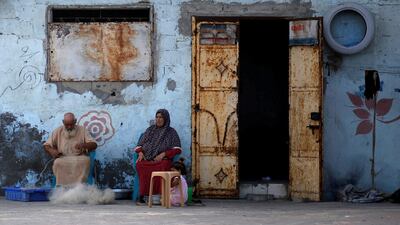The Gaza strip's economy will shrink further this year and into 2019 while its deepening financial hardships could spillover to the West Bank through the banking sector, the International Monetary Fund warned.
Gaza's economy is expected to contract four per cent this year and 1.5 per cent in 2019 in the face of a worsening humanitarian crisis aggravated by large aid cuts and revenue losses, the IMF said in a report on Monday. The West Bank is projected to grow 3 per cent this year and 2.2 per cent in 2019.
"The West Bank is not immune to pressures in Gaza, particularly given the still active financial connections," the Washington-based lender said. "Spillovers from Gaza could have broader implications for the fiscal sector going forward."
The comments followed the IMF's 12-day visit to East Jerusalem and Ramallah on July 8 to assess economic progress in Gaza and the West Bank. Gaza, strangled by years of blockades, is stifling Palestine's economic growth, which will decelerate to 1.5 per cent in 2018 from 3.1 per cent last year, according to IMF forecasts. Unemployment in Palestine was the highest in the world in 2017, standing at 27.4 per cent, and half of Palestinians under 30 are unemployed, the UNCTAD said in a Sept. 12 report.
The liquidity crunch in Gaza could spillover to the West Bank through domestic banks which have "substantial" exposure to both regions, the IMF said.
As economic conditions worsen, Palestinians are relying on their savings to spend on goods and services, which resulted in a slowdown in bank deposits and limited banks' ability to extend credit.
A decision in March 2017 to slash wages of Palestinian Authority employees has undermined their ability to service loans. With weakening borrowers' creditworthiness, banks are increasing cautious about lending new credit in Gaza, and further PA wage cuts from March 2018 could further reduce credit and deposit growth, the IMF said.
Rising fiscal pressure, the banks' exposure to PA employees and increasing credit risks are dampening banks' appetite to lend.
"Anecdotal evidence points to an increase in risk aversion towards extending new credit and a potential pullback by banks in the West Bank, the IMF said.
Sectors including construction, wholesale and retail are highly dependent on credit and slower credit growth could reduce output from these sectors, it said.
Give the "maturing role" of banking in the West Bank and Gaza economies, a spillover from Gaza could have a wide-ranging impact on both regions.
Banks have a strong link with the PA, private sector and key sectors of the Palestinian economy. Any risks to the banking sector, such as an increase in non-performing loans and challenges with funding liabilities, could hit banks' profitability, could lead them to lend less or seek additional financing, the IMF said.
"This could add to fiscal pressures and jeopardize the banking sector’s ability to effectively support economic activity across both Gaza and the West Bank," it said.
______________
Read more
UN General Assembly blames Israel for Gaza violence
UN inquiry approved into killing of Palestinians at Gaza fence
Arab League demands international probe into Israeli crimes
______________
In another blow to the Palestinian economy, an Israeli law to freeze Palestinian funds equal to prisoners' stipends will worsen the already serious financial strains on growth, the IMF said.
The West Bank and Gaza's budget deficit could widen from 8.3 per cent of the GDP this year to 10 per cent next year and beyond as Israel withholds tax revenues it collects on behalf of the Palestinians.
Gaza's descent into an unprecedented humanitarian crisis and economic crisis, with high unemployment and electricity cuts, means it is undergoing a state of "de-development," the UNCTAD said.
"The overriding challenge is to revive growth and alleviate poverty in the face of shrinking resources," the IMF said.
The IMF urged authorities to take measures to ensure a comprehensive approach to reforms.
"The priority is to implement adjustment measures that help protect critical public service delivery, social spending and investment, and avoid a disorderly expenditure rollback disruptive to growth," it said.


